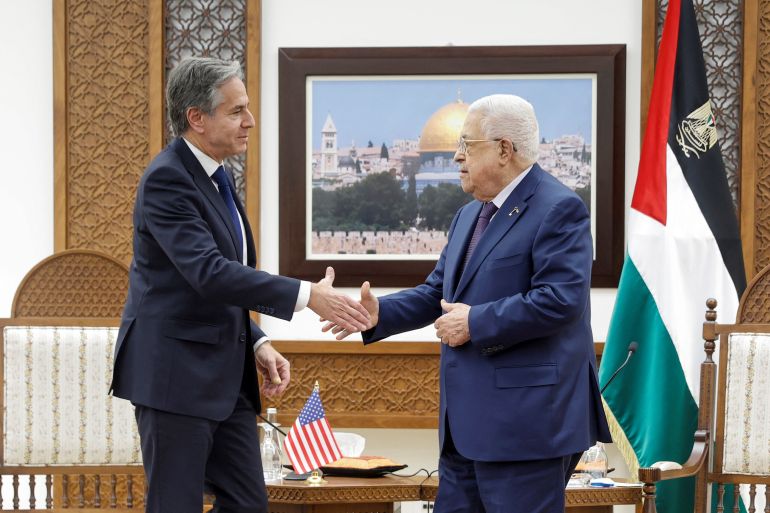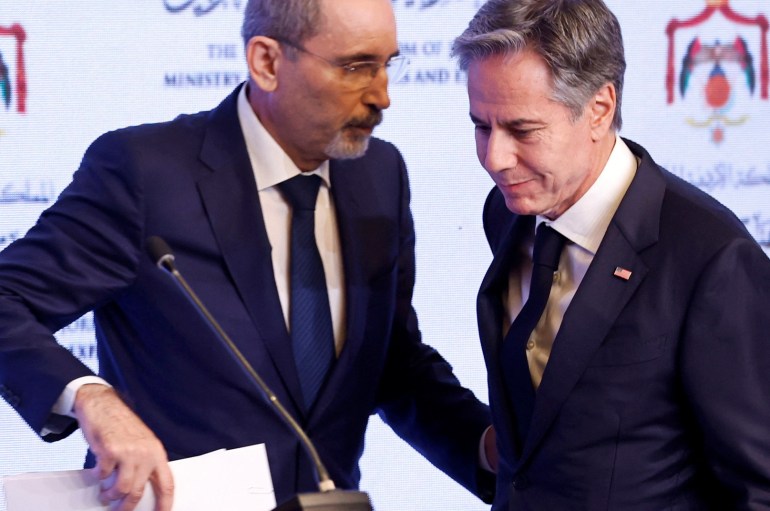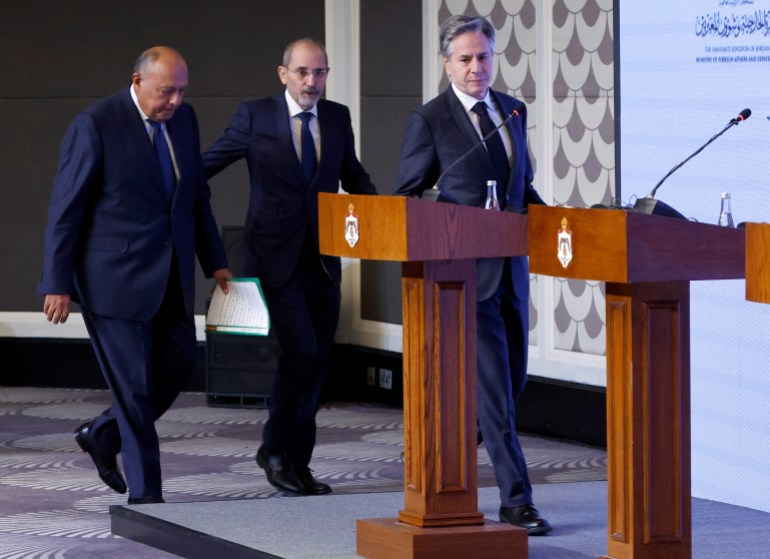Israel-Hamas war: Abbas meets Blinken, joins Arab leaders’ ceasefire call
US secretary of state meets Palestinian President Mahmoud Abbas in Ramallah as mounting Gaza toll angers Arabs.

Palestinian President Mahmoud Abbas told Antony Blinken there must be an immediate ceasefire to the war in Gaza during a meeting with the top US diplomat in the occupied West Bank on Sunday, according to Abbas’s spokesperson, adding to a growing chorus of Arab leaders stressing the need for a truce as the death toll in Gaza approaches 10,000.
Al Jazeera correspondent Mohammed Jamjoom, reporting from Ramallah, said the meeting lasted less than an hour – “far less time than anyone expected” – and finished with no joint news conference or statements, likely indicating “substantial differences and disagreements” between the US and Palestinian positions.
Keep reading
list of 4 items‘Biden, you can’t hide’: Tens of thousands march in US for Gaza ceasefire
Dozens killed after Israel bombs three refugee camps in Gaza
Analysis: Israel’s ground war in Gaza could get much bloodier
“One of the keywords that we heard from the Palestinian president is that [the Palestinians] are seeking a ‘ceasefire’… and demanding that the US seek a ‘ceasefire’,” Jamjoom said.
“That’s one of the key differences… the US has said they will continue to look for humanitarian pauses… they are not seeking a ceasefire.”
The mounting casualties in Gaza have put the US’s diplomatic efforts under further scrutiny by its Arab allies, who have grown increasingly frustrated by the worsening humanitarian situation in the besieged Palestinian territory.
Israel, which continues with its military offensive on Gaza, killed more than 50 people in air raids late on Saturday.
During a news conference in Amman, Jordanian Deputy Prime Minister and Foreign Minister Ayman Safadi stressed that Arab countries want an immediate ceasefire, warning that “the whole region is sinking in a sea of hatred that will define generations to come”.

“We don’t accept that this is self-defence,” Safadi said, referring to Israel’s monthlong assault on Gaza that has killed at least 9,488 Palestinians, more than a third of them children.
“It cannot be justified under any pretext and it will not bring Israel security, it will not bring the region peace.”
Egyptian Foreign Minister Sameh Shoukry, whose country has been acting as the sole conduit for foreigners to escape Gaza and for aid to get in, called for an “immediate and comprehensive ceasefire.”
Rare public divide
In a rare public divide with his Jordanian counterpart, Blinken said the US was against a ceasefire because it would give Hamas more breathing room.
“It is our view now that a ceasefire would simply leave Hamas in place, able to regroup and repeat,” what it did on October 7, said Blinken, referring to the group’s surprise attack into southern Israel that killed some 1,400 Israelis, mostly civilians, according to Israeli officials.
Blinken tried to walk a diplomatic tightrope during his third visit to the region within a month, pushing Israeli Prime Minister Benjamin Netanyahu to accept a temporary “humanitarian pause” and urging for the protection of Palestinian civilians, while also contending with Arab leaders who are urging for a full ceasefire.
Blinken’s “humanitarian pause” call was deemed too weak by Arab leaders, and dismissed by Netanyahu who insisted Israel’s offensive must continue at “full force”.
“I made clear that we are continuing full force and that Israel refuses a temporary ceasefire which does not include the release of our hostages,” Netanyahu said in a televised statement on Saturday.
Israel seemingly drove this message home by bombing multiple United Nations-run schools and refugee centres during Blinken’s visit. The most recent – a strike on al-Maghazi refugee camp in central Gaza early on Sunday – killed at least 47 people.
‘Yes to war’
Al Jazeera’s Alan Fisher, reporting from occupied East Jerusalem, said: “It’s clear there is unhappiness about how the United States is handling this.”
“If this crisis continues, especially [on] the humanitarian side, and if this crisis brings us back full circle to the old containment policy of pre-October 7, I think the American role here, forget right or wrong, but it will not be seen as effective,” said Anwar Gargash, diplomatic adviser to the UAE president.
Al Jazeera’s political analyst Marwan Bishara argued that Blinken’s calls for a “humanitarian pause” without a more serious push to rein in Israel were hollow.
“What does a humanitarian pause mean,” asked Bishara. “It means you give us a few minutes in order to start bombing again. How is that helpful? How does that bring peace? How does that re-establish credibility? How does that end the bloodshed?”
“When Blinken says ‘no ceasefire’ again and again and again, he is saying ‘yes’ to war,” Bishara added. “Blinken has embraced and parroted the Israeli position that we are going with the war until the end.”

Meeting with Abbas
Blinken engaged in another diplomatic challenge on Sunday as he met with Abbas in Ramallah, his first trip to the occupied West Bank since the war began.
The US Department of State kept the visit tight-lipped, refusing to confirm it until after Blinken had physically departed the West Bank. Still, news of his arrival leaked, leading to demonstrations against the visit and US backing for Israel in the occupied territory.
Aside from pleasantries, neither Abbas nor Blinken were seen greeting each other on camera, nor did they issue public statements.
State Department spokesperson Matthew Miller said Blinken had reaffirmed the US’s commitment to ensuring life-saving humanitarian assistance and essential services in Gaza, and emphasised that Palestinians must not be forcibly displaced.
Blinken and Abbas also talked about efforts to reinstall calm and stability in the West Bank, including by halting extremist violence against Palestinians, Miller said, in reference to violence perpetrated by Israeli settlers.
Previously, Blinken had said the Palestinian Authority (PA) could play a future governance role in Gaza as a way out of the conflict, but it was unclear if that topic featured in his discussions with Abbas.
Palestinian activist Fadi Quran told Al Jazeera that Blinken’s main mission was likely to “explain the US position of not asking for a ceasefire” to the Palestinian Authority, which is itself struggling with rising public discontent.
“The Palestinian Authority is bleeding legitimacy… So they are required to ask for a ceasefire, at least publicly,” Quran said.
Talks with Erdogan
After Blinken’s meeting with Abbas, he immediately set off for Turkey to meet Turkish President Recep Tayyip Erdogan, who had been rebuilding relations with Israel before the Gaza war.
Their ties seem to deteriorate due to Erdogan’s fierce pro-Palestine stance and admonishment of Israel’s war-time conduct.
“Netanyahu is no longer someone we can talk to. We have written him off,” Turkish media quoted Erdogan as saying on Saturday as Ankara recalled its ambassador from Tel Aviv.
Israel’s foreign minister responded to the move saying Erdogan had chosen to “take the side” of Hamas over Israel.
The Turkish government's decision to recall its ambassador while the State of Israel is in the midst of a war of self-defense imposed on it by a terrorist organization worst than ISIS, is another step by the Turkish president that sides with the Hamas terrorist organization.… pic.twitter.com/uPsOKt0Huh
— Lior Haiat 🇮🇱 (@LiorHaiat) November 4, 2023